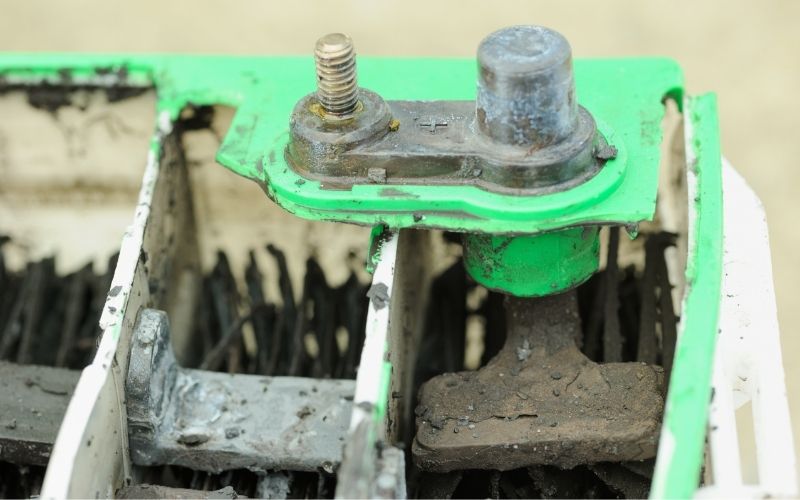You are either reading this article out of curiosity or you’re worried that your marine battery has exploded.
Let’s hope it’s for the first reason!
Hydrogen + Oxygen + Heat = Kaboom! A marine battery can explode because of improper charging, poor maintenance, or a battery failure.
Let’s go through what would cause a marine battery to explode and how to handle it.
We will also give you some tips on how you can avoid a marine battery explosion at all costs.
Table of Contents
What Would Cause a Marine Battery to Explode?
There are several causes of a marine battery explosion.
Here, we’ve listed the three main reasons that cause a marine battery to explode:
- Improper charging
- Poor maintenance
- Battery failure
Although these are the main reasons, there are details within these reasons that need to be further explained.
Improper Charging
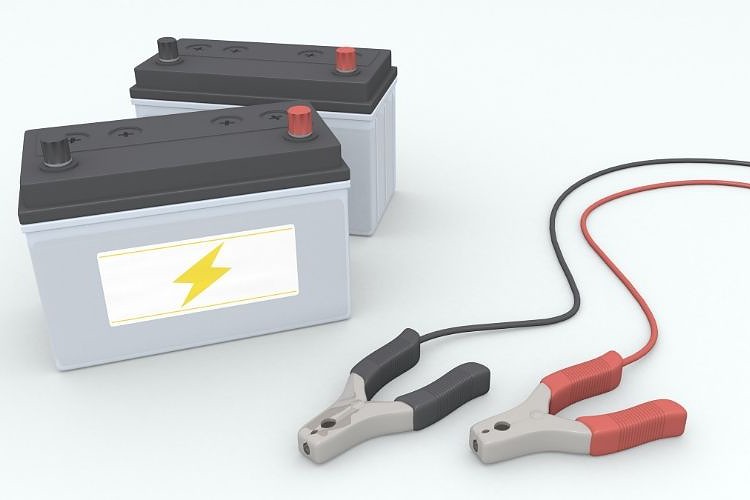
Improper charging can happen in one of two ways: overcharging or using an improper battery charger.
If you are someone who likes to continuously charge your marine battery even after it’s fully charged, we strongly suggest stopping this habit immediately.
When a marine battery is charged properly, its normal electrical energy is converted to chemical energy within the battery.
However, when the battery is overcharged, that chemical energy turns into heat energy, which causes a build-up of pressure sufficient enough to explode your marine battery.
The second way of improperly charging your marine battery is through the use of an incorrect battery charger. If you connect a battery to a charger meant for a larger capacity battery, then you’re charging your battery at a much higher than recommended current.
The plates inside your battery begin to shed, which causes an internal short. That internal short then leads to a large kaboom!
Poor Maintenance
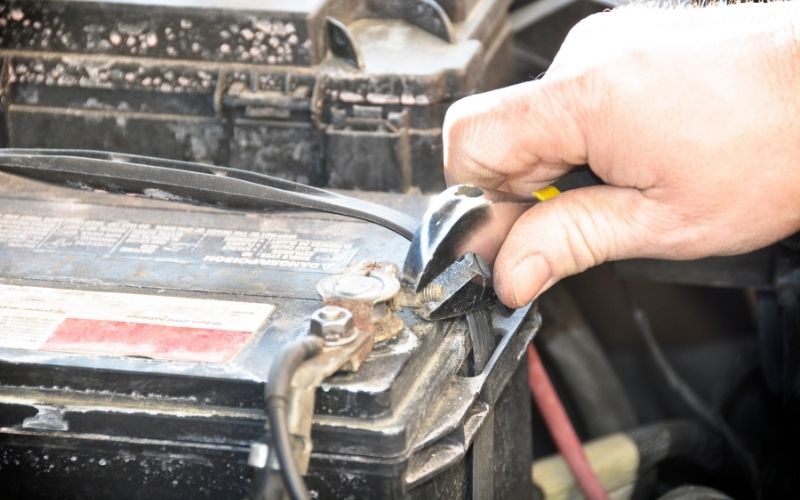
We humans can be a lazy species, which can make us delay proper maintenance of our marine batteries. No one enjoys regular cleaning, though it can be a make or break in a marine battery explosion.
When a battery is left for an extended amount of time, it can increase the possibility of the battery exploding.
If electrolytes levels inside the battery fall below the battery plates, it leads to premature corrosion, causing a short-circuit.
Maintainable vs. Maintenance-free Marine Batteries: What Is Their Risk of Exploding?

Now, just because you have a maintenance-free marine battery, doesn’t mean it’s less likely to explode. If anything, they can be more likely to explode.
Maintenance-free lead-acid batteries are the marine batteries with the highest risk of exploding.
Their battery construction prevents you from topping off electrolyte levels to reduce potential short circuits from exposed plates.
With maintainable lead-acid batteries, you can maintain electrolyte levels which reduce the potential of a battery explosion. Now, whether you keep up with the maintenance or not is up to you.
Battery Failure
We don’t always have control over if or when a battery fails. Sometimes it’s a manufacturing fault to blame for it.
An example of this is if an internal terminal post is not correctly fused to the external terminal lead, causing a dangerous arc to occur. Something as simple as physically moving the battery can cause a short circuit.
When a battery fails to work, a pocket of gas can form on top of your marine battery. Any spark can set off the hydrogen inside your battery, causing an explosion that blows the case open.
What Does It Mean When a Marine Battery Explodes?
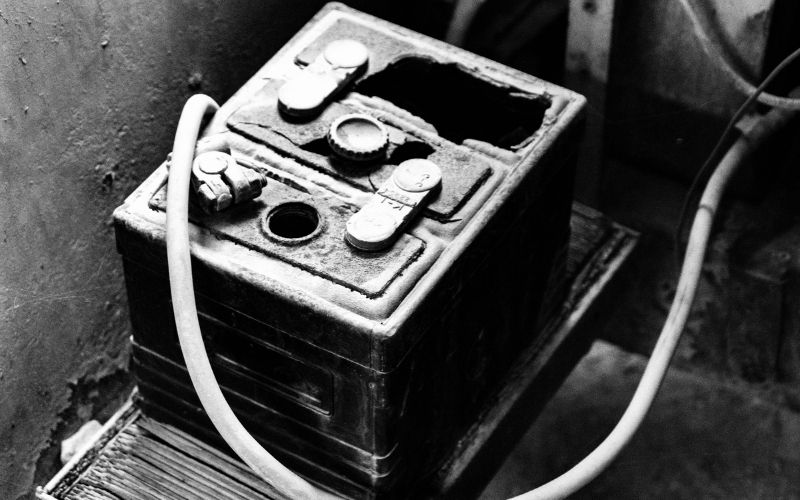
When a battery explodes, it deposits potassium hydroxide onto the battery terminals and sometimes the circuitry within the battery.
This chemical is highly corrosive and immediately starts eating away at the metal parts of a battery.
If your battery explodes, it’s often because hydrogen gasses are not vented properly, or they are exposed to a source of ignition (like a spark) when starting your boat engine.
If this happens, you will need to clean up your battery and then buy a new one to replace it.
How Do You Handle an Exploded Marine Battery?
It’s important to know how to handle an exploded marine battery safely. Cleaning up an exploded marine battery can be dangerous if the battery acid lands on your skin.
The way you handle an exploded marine battery will depend on its chemical makeup. Though, there are preliminary steps you should always take with any kind of battery explosion cleanup:
- Isolate the area, extinguish any open flames and turn off the charger
- Remove metal jewelry and tools from the area
- Put on personal protection equipment (PPE) — wear gloves (rubber, nitrile, or latex), safety goggles, and a face mask
Cleaning Up a Lead-acid Marine Battery Explosion

For lead-acid battery spills, you’ll want to follow these bullet points to safely clean it up.
- First, neutralize the acid with baking soda by covering the area with baking soda
- Wait for the baking soda to stop fizzing or bubbling before cleaning it up
- Absorb the neutralized material onto clay or another type of absorbent material
- Dispose of the neutralized material in the same trash bag as the exploded battery
- Double bag it with two trash bags and seal the bag before disposing
- Make sure to brush under the battery connectors and remove all grime
Cleaning Up a Lithium Marine Battery Explosion

For lithium marine battery spills, you’ll want to be extra careful, as they are more dangerous than a lead-acid battery spill.
Follow these bullet points to safely clean the spill.
- Place the exploded lithium battery in a bag
- Then place the bagged lithium battery in another separate container to contain the explosion
- Dispose of the electronic device that housed the exploded battery
- Clean the lithium spill with WATER ONLY
No matter which type of battery explosion you’re handling, you should always keep a battery acid spill kit on your boat. The spill kit can be a DIY spill kit or a full spill kit bought online.
Just make sure your battery acid spill kit can handle the amount of spillage your marine battery can cause. No one wants to be unprepared!
How to Avoid Marine Battery Explosions?
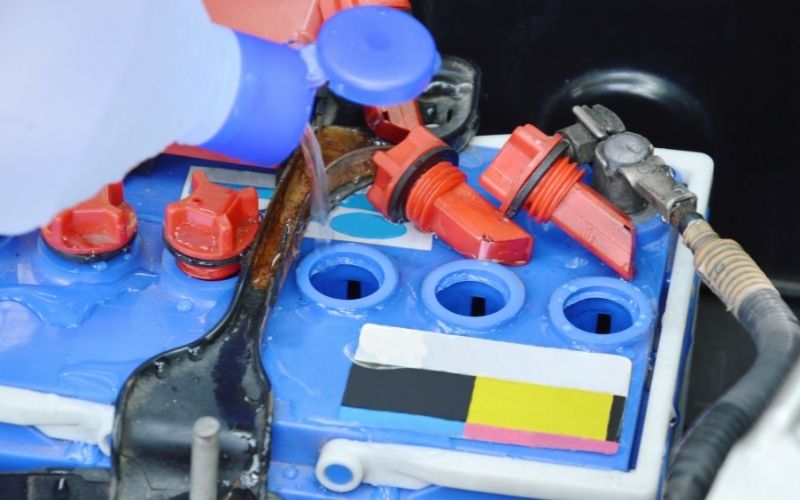
There are several ways you can avoid a marine battery explosion.
Here, we’ve listed a few pointers on preventing a battery explosion in the first place:
- Always make sure your battery compartment is properly vented on the top
- Charge your battery in a space that is well vented where gases can escape
- Keep metal objects and conducting substances away from your charging battery
- Prevent overcharging your battery
- Use the proper battery charge at your battery’s recommended current
- Maintain your lead-acid batteries at the proper electrolyte levels
- Prevent vent holes and vent plugs from clogging due to batteries kept in dirty or dusty environments
- Check for manufacturing defects: make sure battery cables, connections, terminals, screws, and clamps are not damaged
- Don’t smoke cigarettes in rooms where batteries are charging
- Keep your battery away from ignition sources, open flame, or sparks when batteries are charging
Are Lithium-Ion Batteries or Lead-Acid Batteries Safer?
Lead-acid batteries like gel cell, wet cell, AGM, and lithium marine batteries can all explode under the right (or wrong) circumstances.
So now you may be wondering if lithium marine batteries are safer than lead-acid batteries.
Although lithium batteries are higher performers when exposed to high temperatures, they are also more dangerous than lead-acid batteries.
But why?
Lithium batteries store six times the amount of energy as lead-acid batteries. Their energy is stored in smaller compartments, making them ultra-delicate and prone to a more dangerous explosion.
Summary
There are many causes for a marine battery to explode, but the main three causes are improper charging, poor maintenance, and battery failure. Now you understand how marine batteries explode and ways to handle a battery explosion.
You also know the proper ways of cleaning a battery explosion and how to avoid it in the first place.
If there is one thing you take away from this article, let it be to always keep your battery properly vented.
Put these preventative practices in your daily maintenance routine to save you the headache and danger of an exploded battery. Be confident that if your marine battery explodes, you’ll know how to handle it.
Stay safe out there!

Amazon best-selling author & coauthor, Misty Compton is an outdoor enthusiast, raised on water sports, fitness, and writing. CEO of two companies, Daggerwing Publishing House LLC and Organized Otter Administrative Support LLC, she writes and edits content providing great reads, and assists companies remotely by helping them get organized.

